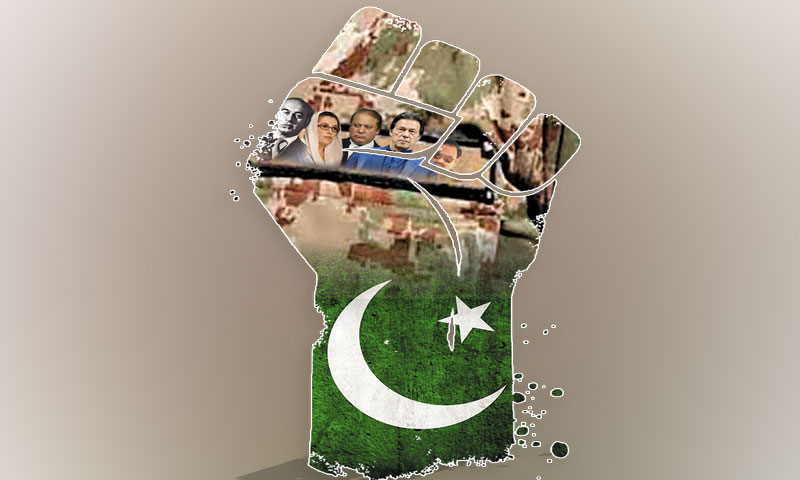Why do politicians fail to resist the Military Generals?
The history of Islam and Muslims is a history of resistance against falsehood and tyranny. Prophet Ibrahim (peace be upon him) had no state, no army, no wealth, and no community under his command, yet he was commanded by God to resist the tyranny of Nimrod, and Prophet Ibrahim demonstrated complete resilience within the bounds of resistance. Similarly, Prophet Musa (Moses) and Prophet Haroon (Aaron) had no government, no state, no army, and no organization, but they were also commanded to resist the tyranny of Pharaoh, and both the chosen prophets resisted Pharaoh’s tyranny.
The Messenger of Allah, Muhammad (SAW), also faced a similar situation in Makkah where he had no state or army under his command, and despite 13 years of preaching, he did not have a large group of companions. Nevertheless, he still challenged the disbelievers and polytheists. The disbelievers even attempted to negotiate with him, offering him leadership, the most beautiful woman in Mecca for marriage, and wealth. In response, the Messenger of Allah (peace be upon him) replied that even if they placed the sun in his right hand and the moon in his left, he would still continue preaching the message of God.
This unparalleled prophetic tradition has left an evident mark on our history. Consequently, Imam Hussain (RA) challenged the authority of Yazid. Although Imam Hussain knew beforehand that he would not succeed in this endeavor, he refused to bow down to the illegitimate and unjust authority of Yazid and became a symbol of resistance against tyranny. In the Indian subcontinent, Mujaddid Alif Sani (may Allah have mercy on him), despite being a Sufi, stood up against Jahangir’s anti-Islamic policies. Shah Waliullah (may Allah have mercy on him), without any political power, sought the help of Ahmed Shah Abdali to break the strength of the Marathas. Tipu Sultan was only a ruler Mysore, fulfilled the duty of representing the entire India. In 1857, Muslims in Delhi and Uttar Pradesh launched the War of Independence against the British. Allama Iqbal and Akbar Allahabadi, known as poets, utilized poetry as a weapon and fiercely critiqued the Western civilization.
Maulana Maududi (RH) simultaneously resisted the West through his writings and raised the banner of truth in front of the usurper rulers of Pakistan. His role in the Qadiani issue led to a situation where the death penalty was pronounced against him. He was offered clemency if he apologized, but he replied, “When I have not committed any wrongdoing, what is there to apologize for?” Consider this: the Muslim declaration of faith, i.e., the Kalimah Tayyibah, is the greatest declaration of resistance against false deities. This declaration marks the beginning of denying all false gods. As long as Muslims do not reject all false deities of the world, they cannot fulfill the right to proclaim ‘La ilaha illallah’ (There is no god but Allah). History proves that for resistance, a Muslim does not necessarily need to be powerful, wealthy, or armed. Iqbal clearly stated:
“He who is a disbeliever relies on the sword,
He who is a believer fights even without a sword.”
If we look closely, the essence of being a Muslim is actually being a ‘free individual.’ Iqbal said it absolutely right:
“What is slavery? Deprived of the sense of beauty and aesthetics,
One whom you call beautiful, is the truly free person.
We cannot trust the insight of slaves,
For in this world, only the eyes of free men can see”
Iqbal is saying that a slave is blind to reason; therefore, we cannot rely on their insight. Only a free individual possesses true insight. Upon analysis, we find that Pakistan’s existence is the result of the resistance of the only superpower at the time, Britain, and the Hindu majority in India. Despite this exceptional history, Muslim leaders, especially in Pakistan, have not shown any tradition of resistance against powerful army Generals.
Zulfikar Ali Bhutto was one of the most important politicians in Pakistan. He was the founder of Pakistan’s atomic program and gave the country the consensus-based Islamic constitution in 1973. He declared Ahmadis as non-Muslims. He organized the conference of Muslim world leaders in Lahore. He got 90,000 Pakistani soldiers held captive by India released. He was popular among the masses, and people eagerly waited for a glimpse of him. However, when General Zia-ul-Haq overthrew Bhutto and sent him to the gallows, Bhutto said, ‘If I am hanged, there will be cries in the Himalayas, and rivers of blood will flow in Sindh.’ But when Bhutto was hanged, nothing happened. Neither were there cries in the Himalayas nor did rivers of blood flow in Sindh. Some desperate people in Sindh committed self-immolation, and some protests took place, but afterward, it was all suppressed.
In the 1980s, Benazir Bhutto initiated the MRD (Movement for the Restoration of Democracy) movement and challenged General Zia-ul-Haq with its platform. However, the MRD movement faced failure as it couldn’t gain enough momentum even for a day to become a nationwide movement. Its impact was limited to rural Sindh. Consequently, General Zia-ul-Haq brutally suppressed the MRD movement in rural Sindh using excessive force. Indira Gandhi, the Indian Prime Minister, further fuelled the situation by stating, ‘General Zia-ul-Haq is oppressing the people of Sindh.’ This statement gave General Zia the opportunity to claim that the MRD movement was backed by India.
Benazir Bhutto was successful in becoming the Prime Minister of the country in 1988, but her success was not due to her resistance to the Generals but rather the result of “reconciliation” with them. Before being given power, she was presented with certain conditions: she would stay away from the atomic program and foreign policy matters, she would not seek revenge from General Zia-ul-Haq’s family and descendants, and she would include three ministers from General Zia’s cabinet in her own cabinet. Benazir Bhutto accepted all these conditions.
When General Pervez (Musharraf) removed Mian Nawaz Sharif from power, Nawaz Sharif had a two-thirds majority. He was immensely popular, especially in Punjab, and had deep roots in the military as well. But after his removal, he couldn’t gather even fifty thousand people for a demonstration in Lahore. Fifteen days after his removal, Mushahidullah organized a demonstration of two dozen people at Regal Chowk in Karachi, which lasted for only two minutes. The reason for this short duration was that the police, present at the scene, swiftly arrested the two dozen protesters and put them into police vehicles.
When Mian Sahib (referring to Nawaz Sharif) arrived in Pakistan from London, he thought that there would be hundreds of thousands of people in Lahore to welcome him. But what to say, even his younger brother, Mian Shahbaz Sharif, did not come to receive him at the airport. Mian Shahbaz Sharif had indeed left home to go to the airport, but he kept roaming the streets of Lahore and did not head to the airport. Other leaders of the Nawaz League, like Khawaja Asif, Ahsan Iqbal, and others, were also in contact with the establishment, and they were also directed not to reach the airport. Only Mushahidullah arrived at the airport, and it was proven that if the other leaders of the Nawaz League had wanted, they could have reached the airport too.
Altaf Hussain was revered in Karachi and Hyderabad; his status as a political leader was high, and he was referred to as “Pir Sahab” (Respected Spiritual Leader). The aura of his spirituality was such that his images began to appear on the leaves of Croton plants. However, when the first military operation against the MQM started, Altaf Hussain would call from London every five minutes to inquire about what was happening in Karachi. He believed that millions of people would be on the streets and alleys, resisting the military. But every time he was told that nothing significant was happening in Karachi. In MQM’s centre, Nine Zero, there were around 2,000 to 2,500 people present, but as soon as the military arrived at Nine Zero, all those people went back to their homes. As a consequence, MQM Haqeeqi’s workers in the city adorned Altaf Hussain’s pictures with garlands made of shoes. They also spat out the red saliva of Pan (betel leaf) on these pictures.
We have witnessed the experiment of Imran Khan. When Imran Khan was removed from power, he was not able to create any resistance. Even when there was a deadly attack on Imran Khan, there was no public reaction. Now, with his arrest on 9th May, another experiment is in front of us. But Imran Khan is attributing this experiment to the agencies. The question is, why do not our politicians resist the generals? One answer to this question is that our political leaders lack moral standing. People can give them votes, and they can cheer for them, but they cannot withstand bullets; they cannot sacrifice their lives for them.
The one miracle of “moral standing” was the reversal of the death sentence of Maulana Maududi. The second miracle came to light regarding Recep Tayyip Erdogan in Turkey. A few years ago, when the Turkish army mutinied against Erdogan, Erdogan was not present in Turkey. He sent a message to the people of Turkey through a telephone message, calling for resistance against the army. And suddenly, with just one message, the major cities of Turkey were taken by a storm, and a large number of people came out of their houses and took to the streets. People lay in front of tanks; they did not even think about the firing from helicopters. And in no time, the military rebellion was unsuccessful.
In Egypt, the Muslim Brotherhood, and in Algeria, the Islamic Front, attempted resistance against the generals. They were not successful, but they tried their best. Success is not necessarily a prerequisite for a Muslim. Imam Hussain could not succeed against Yazid, but he undoubtedly established an enduring symbol of resistance in the history of Muslims. In the Muslim world, particularly in Pakistan, politicians cannot resist the generals because the generals always receive support from another political group against the one they are opposing. General Zia had the support of the Pakistan National Alliance against Bhutto, and the generals had Imran Khan against Nawaz Sharif accessible to them. Today, against Imran Khan, the generals have Nawaz Sharif, Asif Ali Zardari, and Fazlur Rehman.
Dear TNT Reader,
At The News Tribe, our mission is to bring you free, independent, and unbiased news and content that keeps you informed and empowered. We are committed to upholding the highest standards of journalism, as we understand that we are a platform for truth.
Apart from independent global news coverage, we also commit our unique focus on the Muslim world. In an age marked by the troubling rise of Islamophobia and widespread misrepresentation of Muslims in Western media, we strive to provide accurate and fair coverage.
But to continue doing so, we need your support. Even a small donation of 1$ can make a big difference. Your contribution will help us maintain the quality of our news and counteract the negative narratives that are so prevalent.
Please consider donating today to ensure we can keep delivering the news that matters. Together, we can make a positive impact on the world, and work towards a more inclusive, informed global society.
Donate Monthly Subscription Annual Subscription





